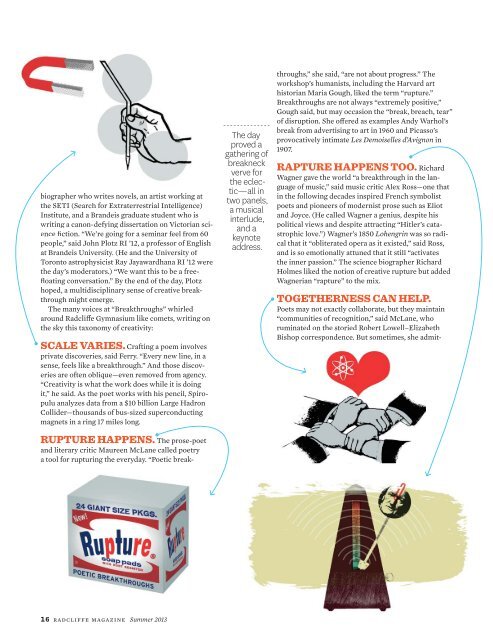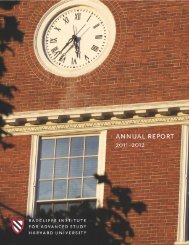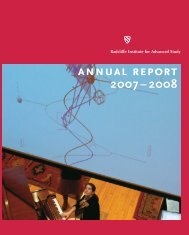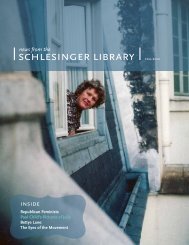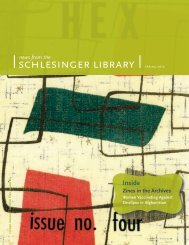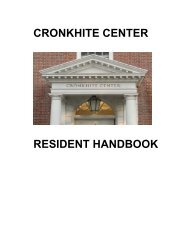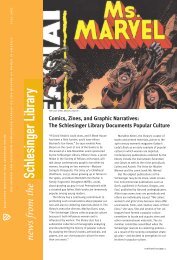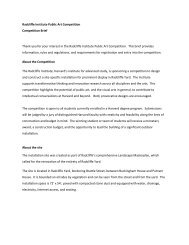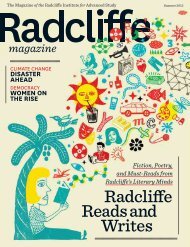Download - Radcliffe Institute for Advanced Study - Harvard University
Download - Radcliffe Institute for Advanced Study - Harvard University
Download - Radcliffe Institute for Advanced Study - Harvard University
You also want an ePaper? Increase the reach of your titles
YUMPU automatically turns print PDFs into web optimized ePapers that Google loves.
iographer who writes novels, an artist working at<br />
the SETI (Search <strong>for</strong> Extraterrestrial Intelligence)<br />
<strong>Institute</strong>, and a Brandeis graduate student who is<br />
writing a canon-defying dissertation on Victorian science<br />
fiction. “We’re going <strong>for</strong> a seminar feel from 60<br />
people,” said John Plotz RI ’12, a professor of English<br />
at Brandeis <strong>University</strong>. (He and the <strong>University</strong> of<br />
Toronto astrophysicist Ray Jayawardhana RI ’12 were<br />
the day’s moderators.) “We want this to be a freefloating<br />
conversation.” By the end of the day, Plotz<br />
hoped, a multidisciplinary sense of creative breakthrough<br />
might emerge.<br />
The many voices at “Breakthroughs” whirled<br />
around <strong>Radcliffe</strong> Gymnasium like comets, writing on<br />
the sky this taxonomy of creativity:<br />
SCALE VARIES. Crafting a poem involves<br />
private discoveries, said Ferry. “Every new line, in a<br />
sense, feels like a breakthrough.” And those discoveries<br />
are often oblique—even removed from agency.<br />
“Creativity is what the work does while it is doing<br />
it,” he said. As the poet works with his pencil, Spiropulu<br />
analyzes data from a $10 billion Large Hadron<br />
Collider—thousands of bus-sized superconducting<br />
magnets in a ring 17 miles long.<br />
RUPTURE HAPPENS. The prose-poet<br />
and literary critic Maureen McLane called poetry<br />
a tool <strong>for</strong> rupturing the everyday. “Poetic break-<br />
The day<br />
proved a<br />
gathering of<br />
breakneck<br />
verve <strong>for</strong><br />
the eclectic—all<br />
in<br />
two panels,<br />
a musical<br />
interlude,<br />
and a<br />
keynote<br />
address.<br />
throughs,” she said, “are not about progress.” The<br />
workshop’s humanists, including the <strong>Harvard</strong> art<br />
historian Maria Gough, liked the term “rupture.”<br />
Breakthroughs are not always “extremely positive,”<br />
Gough said, but may occasion the “break, breach, tear”<br />
of disruption. She offered as examples Andy Warhol’s<br />
break from advertising to art in 1960 and Picasso’s<br />
provocatively intimate Les Demoiselles d’Avignon in<br />
1907.<br />
RAPTURE HAPPENS TOO. Richard<br />
Wagner gave the world “a breakthrough in the language<br />
of music,” said music critic Alex Ross—one that<br />
in the following decades inspired French symbolist<br />
poets and pioneers of modernist prose such as Eliot<br />
and Joyce. (He called Wagner a genius, despite his<br />
political views and despite attracting “Hitler’s catastrophic<br />
love.”) Wagner’s 1850 Lohengrin was so radical<br />
that it “obliterated opera as it existed,” said Ross,<br />
and is so emotionally attuned that it still “activates<br />
the inner passion.” The science biographer Richard<br />
Holmes liked the notion of creative rupture but added<br />
Wagnerian “rapture” to the mix.<br />
TOGETHERNESS CAN HELP.<br />
Poets may not exactly collaborate, but they maintain<br />
“communities of recognition,” said McLane, who<br />
ruminated on the storied Robert Lowell–Elizabeth<br />
Bishop correspondence. But sometimes, she admit-<br />
16 radcliffe magazine Summer 2013


